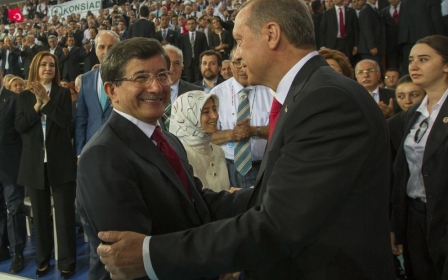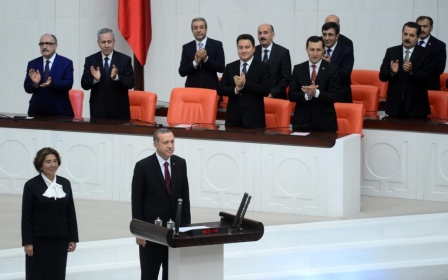Davutoglu's new cabinet sworn in

Turkey's newly appointed Prime Minister Ahmet Davutoglu announced his cabinet on Friday, a day after President Recep Tayyip Erdogan charged him with forming a new government.
There are four new names in the newly formed cabinet - EU relations minister, customs and trade minister and two of three deputy prime minister posts.
Mevlut Cavusoglu has replaced Davutoglu, as Turkey’s new foreign minister. Cavusoglu served for eight months as Minister for European Affairs after stepping in to replace Egemen Bağış, one of the ministers associated with Turkey’s corruption scandal in December 2013.
Volkan Bozkir, the former head of the Turkish parliament's Foreign Affairs Committee, has become the new European Union affairs minister. Bozkir will be responsible for ensuring that membership negotiations with the EU - currently at a relative low - remain on track.
Yalcin Akdogan and Numan Kurtulmus - two close allies of Erdogan - are the newly appointed deputy prime ministers.
Akdogan, a former journalist and academic, was Erdogan’s top political advisor while Kurtulmus is a leading conservative within AKP and former follower of Turkey’s first Islamist prime minister Necemttin Erbakan. Kurtulmus who joined AKP in 2012, is known for branding the party as one of 'conservative democrats'.
Nurettin Canikli, former deputy head of the Justice and Development Party's parliamentary group, has been appointed as the new minister of customs and trade.
On Wednesday, when Davutoglu was formally elected as chairman of the ruling Justice and Development Party, he mentioned nine priorities for the new government including economic prosperity, foreign affairs, education, the Kurdish peace process and the corruption cases.
Erdogan’s imprints
The new cabinet is not expected to be a harbinger of significant policy changes and observers say Erdogan’s imprints are strongly visible in the choices for appointments.
“Kurtulmus and Akdogan are two close allies of the president and their invitation into the cabinet is a sign of Erdogan's creation of a centre of power within the government,” said Taptuk Emre Erkoc, director of the Turkey Institute and visiting fellow of political science at Queen Mary University.
Both Kurtulmus and Akdogan are first time parliamentarians.
“Akdogan has been a good friend and advisor to the former prime minister and was one of the people who influenced AKP political stances,” added Erkoc.
Erdogan has pledged to press for constitutional changes after the 2015 general election to extend presidential powers from their largely ceremonial role to an US-style executive power system.
“Turkey has been moving towards the consolidation of leadership under Erdogan; it is naïve to assume the cabinet was formed by Davutoglu,” said Sevgi Akarcesme, columnist at Today’s Zaman, a Turkish paper closely linked to the Gulen Movement.
Erdogan and the Gulen Movement have been involved in a power struggle which escalated in 2013 when corruption allegations against the premier and his inner circle, posed by the movement’s leader Fethullah Gulen and his followers, caused a huge rift.
“The main goal of this new government is to control any dual judicial process in the face of the corruption allegations to cover up the cases,” said Akarcesme.
Davutoglu has been clear about pursuing investigations and prosecutions related to the corruption allegations, saying that it is among the government's priorities to deal with any corruption cases justly.
Kurdish peace process
Another top priority for the Turkish government is the Kurdish peace process. Erdogan launched peace talks in 2012 with the Kurdish PKK which waged a war on Turkish authorities in 1984 for self-rule.The talks stalled in September when the rebels accused the government of failing to deliver on reform.
Some observers believe that Kurtulmus will become the new leader for the Kurdish peace process after former deputy prime minister Besir Atalay has been removed from the cabinet.
Atalay played an important role in talks with the Kurds and, as a close Erdogan loyalist, had been expected to remain in place at a time when negotiations with the Kurdish leadership are one of the government’s highest priorities.
While it is likely that Kurtulmus will be in charge of the peace process, Akdogan, Erdogan's former top advisor, has also been named as a potential leader.
“If Kurtulmus takes over, it is expected that the negotiations will be more open and inclusive of different voices. If Akdogan leads this process, however, he will continue with Atalay’s legacy of secrecy,” Bacli explained.
“The peace process is expected to be accelerated, with PKK leader Abdullah Ocalan having more say in the talks. The debate of the autonomy of the region is not going to be a surprise,” said Akarcesme of Today's Zaman.
Strong economy
For many, the most important news is that Ali Babacan, the Deputy Prime Minister for Economic Affairs, and Mehmet Şimşek, the Minister of Finance have not been moved from their posts. Babacan, in particular, was thought to be ready to leave politics and to have weakened his support as a result of his conventional economic policies.
There were also speculations that Yusuf Bulut, a former chief adviser to Erdogan, would take Babacan's place, yet Babacan’s reappointment indicates that Davutoglu and his advisers are not looking to make radical changes to the current economic policies.
“There were fears that Yusuf Bulut – a man who knows little about the economy and is a bit of a conspiracy theorist – would become the new economy minister,” Erkoc said.
“Babacan staying in place reflects that the government is aware of Turkey’s economic challenges. Babacan has a credible profile among international investors and organisations and will be able to formulate Turkey’s monetary and fiscal policies as well as establish some needed structural changes,” he added.
Continuity in foreign policy
Turkish observers envision the country's foreign policy to be largely continuous with that of the previous cabinet.
“While Cavusoglu's and Bozkir's stances on foreign policy will not be hugely different to those of Davutoglu, they can both speak a language that will be well-received by the West,” said Zeynep Kandur, head of the women’s branch of AKP’s foreign affairs
The cabinet is likely to focus on Turkey’s membership in the EU and consolidating foreign relations with the West.
“Bozkir, as an experienced diplomat, will bring in a new dimension to Turkey’s EU membership. We have been suffering from rather undiplomatic declarations former EU ministers,” said Balci.
Davutoglu will leadTurkey into the 2015 legislative elections which are expected to enable AKP to amend the constitution and formally implement an executive presidential system.
New MEE newsletter: Jerusalem Dispatch
Sign up to get the latest insights and analysis on Israel-Palestine, alongside Turkey Unpacked and other MEE newsletters
Middle East Eye delivers independent and unrivalled coverage and analysis of the Middle East, North Africa and beyond. To learn more about republishing this content and the associated fees, please fill out this form. More about MEE can be found here.




